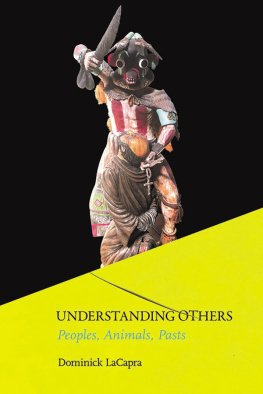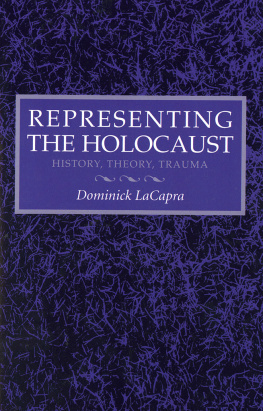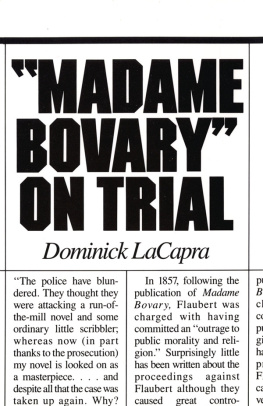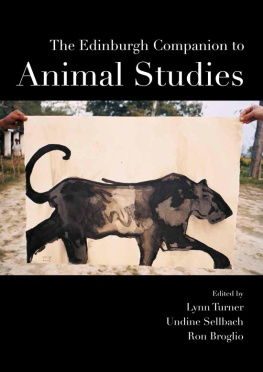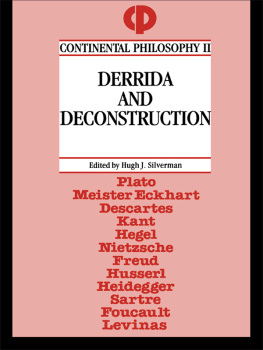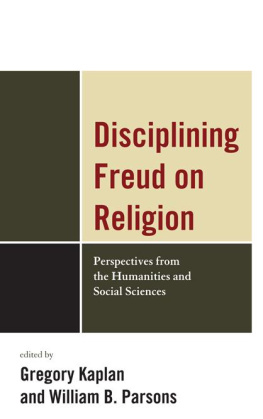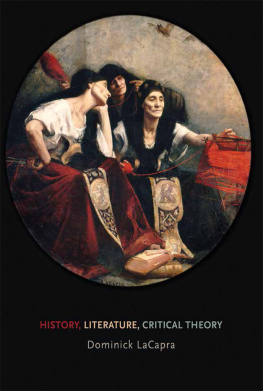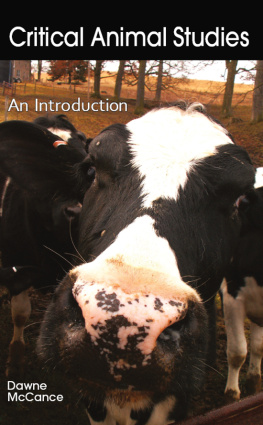UNDERSTANDING OTHERS
PEOPLES, ANIMALS, PASTS
Dominick LaCapra
CORNELL UNIVERSITY PRESS
Ithaca and London
To the many rescue animals with whom we have shared life for over forty years
It must not be supposed that transference is created by analysis and does not occur apart from it. Transference is merely uncovered and isolated by analysis. It is a universal phenomenon of the human mind, it decides the success of all medical influence, and in fact dominates the whole of each persons relations to his human environment.
Sigmund Freud, An Autobiographical Study (1925)
Were all in this together.
Senator Bernie Sanders (2016)
Why rob a bank when you can own one?
Mackie Messer in Bertolt Brecht and Kurt Weill, The Threepenny Opera (1928)
A melancholy point of view, for it bases the world order on a lie.
Franz Kafka, Before the Law (1915)
Pessimism of the intellect, optimism of the will.
Antonio Gramsci, letter from prison (1929)
Contents
Introduction
The title of this book indicates my concern with an inquiry into the possibilities and limits of understanding as well as of relating in practice to others, especially in specific historical contexts. This inquiry crucially includes an attempt to come to terms with problems such as transference, projection, victimization, and scapegoating. It would be an understatement to say that the other, including the other within, has been a concern of critical thought for quite some time. Perhaps the most influential notion of the other (or others) within has been Sigmund Freuds understanding of unconscious processes. Emmanuel Levinass notion of an absolute, totally other, which he finds basic to ones infinite ethical responsibility toward others, has also become prevalent, especially in terms of Jacques Derridas adoption of it with respect to every other who is asserted to be totally other.1 I find to be of particular heuristic value the Freudian idea that in every other (as in oneself), there is something other, in the form of unconscious processes that limit the fulfillment of the classical dictum Know thyself, while qualifyingbut not entirely disqualifyingthe applicability of the ideal of individual identity, agency, and responsibility. The attempt to expel this other within, which problematizes identity and causes anxiety in the self, and to project it onto a discrete other, is one dimension of the process of scapegoating that creates a clear-cut binary opposition between self and other (or us and them).
In Freud alterity or otherness is linked to the role of transference, which signals the mutual but differential implication of the self in others. Transference has an inherently social dimension in its bearing on mutual implication that in a sense brings primary heteronomy and the tendency to repeat, at times compulsively. It also is a basis of empathy or compassion, indeed care and love, and, in a negative form, of hatred, animosity, scapegoating, and violence. It makes identity and relative autonomy regulative ideals that may not attain fulfillment but that may be sufficiently achieved to allow for moral responsibility and political agency. Transference as self-implication, involving a tendency to repeat, is most evident and perhaps most forceful with respect to ones relation to authority and idealized figures, real or fantasized. It may also offer a broader perspective on the issue of participant observation, significant in anthropology and pronounced in the life and work of Frank Hamilton Cushing. And it has links with Jacques Derridas approach to deconstruction and with M. M. Bakhtins inquiry into dialogization in language use.
Freud denied a role in the unconscious for ordinary or chronological time. But the case is different for uncanny forms of temporality such as the return of the repressed, belated effects, and compulsive repetition. The latter seem to suspend time and, in post-traumatic symptoms such as recurrent dreams, involve a captivating sense of full presence or the feeling that one is back there reliving a past that seems intemporal and is existentially more real than any actual present or future. A challenge is to see how transference and the repetition compulsion may be cogently argued to be at work or at play in various areas of both individual and collective life, perhaps even in governmental policies and social action. A difficult question concerning transference is how and in what ways it is possible to repeat after the fact, or belatedly reexperience and reenact, something as profoundly traumatic and seemingly alien as aspects of the Holocaust or other extreme events involving violence, scapegoating, and abuse, perhaps events one has never directly experienced oneself. And how can one come to terms with and, to some extent, work through, such possibly incapacitating experiences in ways that enable the understanding of othersother peoples, animals, and pastsnot simply as alien entities or as projections of the self?
There may still be historical work to do on events of the Holocaust itself. But there is also the important issue of its aftermath, including its at times belatedly traumatic effects on children and intimates of perpetrators, victims, and others involved in it. This aftermath also raises the question of relations both actual and theoretical to other possibly traumatic phenomena such as abuse, racism, scapegoating, and colonialism. Attention to trauma is not restricted to, but in recent thought may often be epitomized by, the Holocaust and its aftermath. But trauma in general has aftereffects and is attended by the issue of its contestable representation in various areas (such as historiography, film, literature, and other forms of art) and its at times questionable uses in politics and more generally in society and culture.
Understood in more or less revisionary ways, psychoanalysis is not a psychology in any conventional sense. Rather it is a form of critical theory whose basic concepts (transference as well as trauma, repression, dissociation, denial, repetition, displacement, condensation, projection, incorporation, acting out, working over, and working through) are best understood as undercutting the opposition between individual and society and as individuated or collectivized in different ways in various contexts. Most significantly, basic psychoanalytic concepts signal the mutual implication and interaction of the individual and the social as well as pointing to the role of political thought and action (notably as a crucial dimension of working through problems that call for compassion and respect for otherness or difference but are not simply psychic). All of the various procedures and defense mechanisms discussed by Freud are quite significant. They play differential roles in different times and places and may have analogues (such as exorcism) that cannot simply be reduced to them. I find the tendency to divert and displace or pivot and project to be almost compulsively pronounced in recent political and social events, and hence at times place special emphasis on it.
As regards transference, the historian is not in a unique position, although certain techniques may serve as safeguards. Objectification is one such technique, as is its complement, contextualization. But, taken to an extreme, such techniques may involve the denial of transference, which, despite denial, may nonetheless take place in uncontrolled forms. This is not the place to analyze the work of various historians in this regard.2 But one notable example of repetition with minimal change with respect to a seemingly objectified study is Andreas Hillgrubers Zweierlei Untergang: Die Zerschlagung der Deutschen Reiches und das Ende des europaschen Judentums .3 In it Hillgruber argues that the historian studying these two downfalls must take the putative perspective of the German nation as a whole (excluding the victims) and empathize with Germans in the east (where Hillgruber himself came from), notably German soldiers fighting the invading Russians on the eastern front. Germans on the eastern front may well deserve empathy or compassion as victims of killing, rape, and plunder by invading Russians. But, in generalizing in an exclusionary manner and focusing on the military, Hillgruber repeats in his own historical discourse what he construes as German perspectives during the war, even going to the point of setting up a dubious equivalence between the devastation of the Reich ( Zerschlagung is a very charged term) and the euphemistically termed end of Jewry in Europe. (Jewry did not end. Jews were rounded up, confined, tortured, and killed, and their cultureor Judentum was attacked and to a significant extent destroyed, fortunately and in spite of declared Nazi intentions, not to the point of bringing them or it to an end.)

